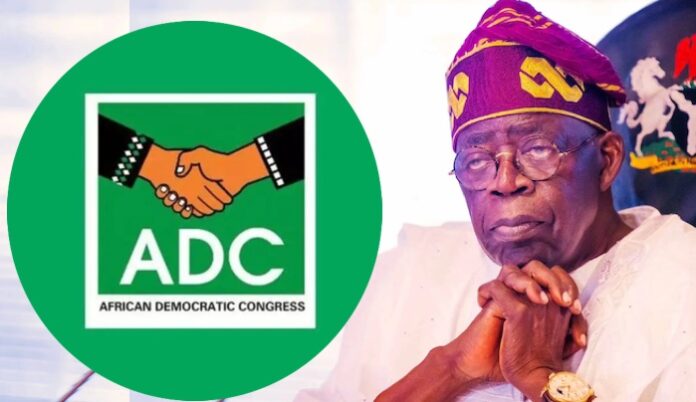The African Democratic Congress (ADC) has described the World Bank’s October 2025 report which shows that 139 million Nigerians are now living below the poverty line, up from 81 million in 2019, as clear confirmation that the economic policies of the Tinubu-led APC government have ruined the lives and livelihoods of the majority of Nigerians.
In a statement signed by its National Publicity Secretary, Mallam Bolaji Abdullahi, the ADC said the report exposes the wide gap between the government’s rhetoric of economic progress and the lived reality of Nigerians, noting that while the administration celebrates increased revenue and meeting revenue targets, more citizens are slipping into abject poverty at a rate never seen before in Nigeria.
The party also accused the government of masking its domestic economic failures with “creative statistics” that paint rosy pictures of economic progress while the people continue to suffer.
The full statement read:
“The African Democratic Congress has been studying the October 2025 World Bank Report, which states that 139 million Nigerians now live below the poverty line, up from 81 million in 2019. That figure, representing 61% of the population, is clear evidence that the economic policies of the Tinubu-led APC government have actually sent more Nigerians into abject poverty, contrary to the government’s performance propaganda and claims of progress.
“The World Bank numbers tell a simple but painful story: under the APC and President Bola Tinubu’s government, more Nigerians have fallen into poverty than at any other time in our history. In 2019, four out of ten Nigerians were poor. Today, it is at least six out of ten.
“We recall that President Tinubu, in his recent Independence Day address to the nation, declared triumphantly that ‘the worst is over’ while bandying statistics that have now been proven to be calculated whitewash to serve the government’s narrative of progress. However, what is important is the reality that those numbers were meant to hide. Behind President Tinubu’s shiny statistics are the grim realities of historic human suffering — families skipping meals, children dropping out of school, and households selling assets just to buy food and basic drugs to survive.
“Under the APC, nearly 30 million Nigerians have now joined the ranks of the ultra-poor — those who, even if they spend every naira they earn on food, still cannot afford enough calories to survive.
“While the government celebrates record revenue collection and the illusion of economic stability, the World Bank’s data shows that Nigerians are actually growing poorer by the day. Food inflation has gone through the roof, with the price of a bag of rice multiplying five times in just four years. Poor families now spend roughly 70 percent of their income on food, leaving nothing for rent, school fees, or medicine.
“The so-called social safety nets that should protect the vulnerable have also collapsed. Coverage has fallen from 20 percent in 2019 to just 6 percent in 2025. Government support to the poorest citizens is almost non-existent, amounting to a mere 0.14 percent of GDP compared to a global average of 1.5 percent.
“What all this means is that Nigerians are worse off under the APC and President Bola Tinubu’s government. And contrary to the President’s claim, the worst is not over; instead, it appears that the worst has actually not arrived. Rather than continuing to dig in to defend its propaganda, the government should accept the unbiased verdict from its partner, the World Bank, and try to make amends before it is too late.
“To make matters worse, the government’s entire approach to poverty measurement now seems designed to flatter itself rather than to help the poor. Nigeria’s domestic poverty threshold, roughly ₦137,000 per month, or about $90, sits far below the global real-value benchmark. By using a deflated local measure, the government effectively undercounts millions of poor Nigerians.
“The implication of this ‘race to the bottom’ statistics is that, using the Tinubu government’s revised definition of poverty, citizens who are globally poor will appear statistically fine in Nigeria. In reality, however, they would have become invisible to a policy that mistakes low expectations for progress. A poverty line that is set too low does not protect the poor; it hides them. The APC cannot fix poverty by attempting to redefine it downward.
“The ADC believes that what Nigeria needs now is not cosmetic reform. We need a government that puts the people first and understands that inclusive growth is not just another slogan — it is a conscientious strategy.
“The ADC therefore calls on the Tinubu-led APC government to stop celebrating revenue as achievement and start putting the people first by prioritising food security, job creation, and targeted social protection systems that shield the 139 million vulnerable Nigerians that their ill-thought-out economic policies have created.”

